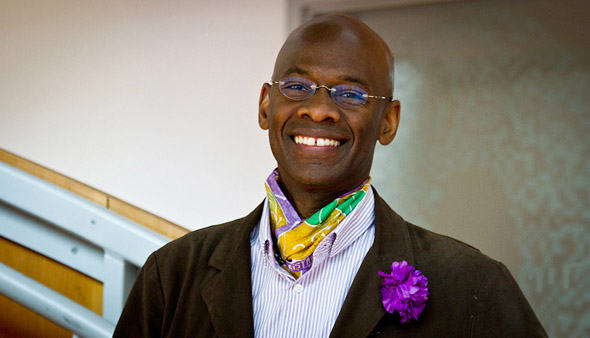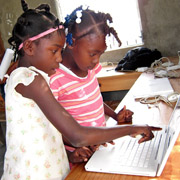Remarks by Michel DeGraff upon receiving the 2016 MIT Martin Luther King Jr. Leadership Award

“In Haiti today, most Haitians are excluded from access to quality education and from the means to create and transmit wealth. Indeed most laws and decrees, most written press, most textbooks, most official exams are written in one language (French), which the vast majority of Haitians do not speak. Yet most everyone in Haiti speaks one language in common: Haitian Creole (Kreyòl).”
— Michel DeGraff, Professor of Lingustics; Director, MIT-Haiti
Michel DeGraff, MIT-SHASS Professor of Linguistics, is a founding member of Haiti's newly created Haitian Creole Academy (Akademi Kreyòl Ayisyen) and Director of the MIT-Haiti Initiative. On February 10, 2016, he offered the following remarks upon accepting an MIT Martin Luther King Jr. Leadership Award, presented annually to students, alumni, staff, groups, and faculty who embody the spirit of Dr. King’s work.
I am from Haiti. In Haiti, when we enter a room and greet our audience, we say, in Haitian Creole, “Onè,” which means that we honor each and all of you in the audience. And the audience responds “Respè” as a show of respect. So let’s all give it a try: “Onè… Respè…”
Now I’d like to say "Mèsi anpil!" (i.e., Thank you very much!) to the organizers of this beautiful lunch. Thank you as well to MIT for this long tradition, which started long before we had a national MLK Jr. Day. In this tradition, we at MIT celebrate Martin Luther King Jr. with both words and actions. I would also like to thank the anonymous colleagues who nominated me and who wrote letters on my behalf. I also thank my MIT department, Linguistics and Philosophy, and the School of Humanities, Arts and Social Sciences.
And I especially want to thank my MIT-HAITI team. We are a pretty large group across all of MIT and in Haiti. At MIT the team includes allies in various units: from MIT Sloan to Linguistics to the School of Science, the School of Engineering, the Office of Digital Learning, the Teaching and Learning Lab, etc. In Haiti, we work in close collaboration with educators across a wide range of public and private universities and with leaders in the Haitian Government, especially the Ministry of National Education. Together we are developing, evaluating and disseminating state-of-the-art digital resources in Haitian Creole for active-learning methods in Haiti.
I’ll soon give you some historical background and more details on these efforts, which live up to the spirit of Martin Luther King Jr.’s legacy that we are celebrating today. But before that, I’d like to insist that without our MIT-Haiti team, I could not have gotten this award. This award is not mine, it’s ours: it’s an award to our teamwork, teamwork with amazing colleagues at MIT and in Haiti who so strongly believe that together we can change the world as we confront a formidable global challenge.
“One dream can change the world.” This is the tagline of the inspiring movie Selma about Martin Luther King Jr., which I saw recently.
Toward the beginning of the film, there’s a haunting scene, from the early ’60s before the Voting Rights Act. That scene highlights Ms. Annie Lee Cooper, played by actress Oprah Winfrey. For many years, Ms. Cooper has been trying, in vain, to register to vote in Selma. On her fifth attempt, her application is again rejected. Why? Because of yet another totally artificial barrier: she’s being asked by a white clerk to recite the names of all the 67 county judges in Alabama! Obviously, she cannot. Who could?
In Haiti, such barriers to full citizenship are even more brutal, and have been entrenched through language and education throughout the history of the country, all the way back from the colonial period when much European wealth depended on the work of enslaved Africans.
Read Michel DeGraff's complete remarks

Suggested Links
MIT MLK Leadership Award website
MIT Linguistics
Michel DeGraff on Haiti's new policy for teaching in Kreyol
A champion of Creole | MIT News
A new leadership model for a new Haiti | MIT News
xTalk | MIT-Haiti Initiative: Opening Up Quality Education via Mother Tongue & Technology